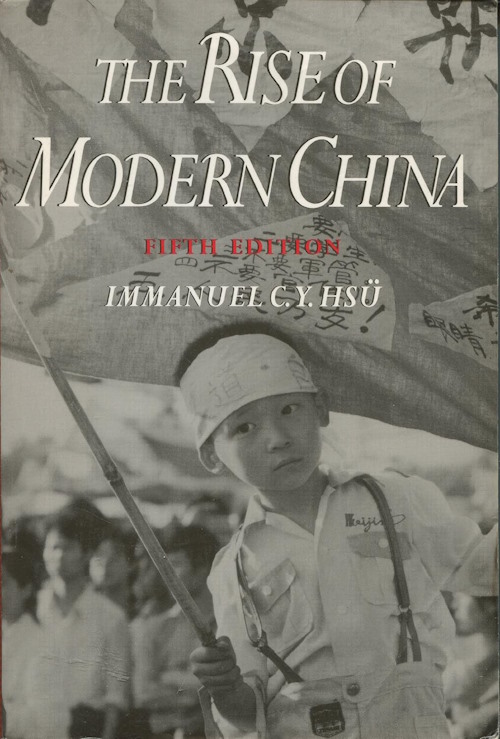| Author | Clubb, O. Edmund (Oliver Edmund), 1901-1989 |
| Place | New York |
| Publisher | Columbia University Press |
| Collection | Ricci Institute Library [ASCC] |
| Language | English |
| Type | Book |
| Shelf | Stacks [ASCC] |
| Call Number | DS774.C57 1964 |
| Description | xii, 470 p. : illus. ; 24 cm. |
| Note | 20th century China / O. Edmund Clubb. Delay of the dynastic principle -- The revolution that failed -- The birth of modern Chinese nationalism -- Revolutionaries against the warlords -- "First pacification, then resistance" -- The resurgence of Chinese nationalism -- The second Sino-Japanese War -- Kuomintang-Communist struggle: final stage -- The new regime -- Peking at the Crossroads -- Shift in Peking's foreign policy -- Communist China today. Includes index. 7th prt. of 1966. |
| LCCN | 64011041 |
| Multimedia |  |
| Author | Bland, J. O. P. (John Otway Percy), 1863-1945 |
| Place | London, Philadelphia |
| Publisher | William Heinemann, J.B. Lippincott Company |
| Collection | Bibl. Sinensis Soc. Iesu |
| Language | English |
| Type | Book |
| Shelf | Rare Book Stacks |
| Call Number | DS740.63.R323 B616 1912 |
| Description | xi, 481, [55] ℓ of plates : ill., maps ; 25 cm. |
| Note | Recent events and present policies in China / by J. O. P. Bland. Errata slip inserted. |
| LCCN | 13-136 |
| Author | Thomson, J. S. |
| Place | Indianapolis, IN |
| Publisher | Bobbs-Merrill Co. |
| Collection | Ricci Institute Library |
| Language | English |
| Type | Book |
| Shelf | Rare Book Stacks |
| Call Number | DS709.T48 1909 |
| Description | 441 p; 22 cm. |
| Note | The Chinese / Thomson, J. S. On title page: Illustrated from photographs, "One seeing, however, is better than athousand people telling you of it." - Chinese Proverb. |
| ISBN | 0665976607 ; 9780665976605 |
| Author | Hsü, Immanuel Chung-yueh 徐中約, 1923-2005 |
| Place | New York, Oxford, England |
| Publisher | Oxford University Press |
| Collection | Ricci Institute Library [ASCC] |
| Edition | 5th ed. |
| Language | English |
| Type | Book |
| Shelf | Stacks [ASCC] |
| Call Number | DS754.H74 1995 |
| Description | xxvii, 1017 pages : illustrations, maps ; 25 cm. |
| Note | The rise of modern China / Immanuel C. Y. Hsü. First ed. published in 1970. Title also in Chinese: Zhongguo jindaishi 中國近代史. Contents: 1. A Conceptual Framework of Modern China
I. The Persistence of Traditional Institutions, 1600-1800.
2. The Rise and Splendor of the Ch'ing Empire.
3. Political and Economic Institutions.
4. Social and Intellectual Conditions.
5. Foreign Relations.
6. The Turn of Dynastic Fortune: From Prosperity to Decline
II. Foreign Aggression and Domestic Rebellions, 1800-1864.
7. The Canton System of Trade.
8. The Opium War.
9. The Second Treaty Settlement.
10. The Taiping Revolution and the Nien and Moslem Rebellions
III. Self-strengthening in an Age of Accelerated Foreign Imperialism, 1861-95.
11. The Dynastic Revival and the Self-strengthening Movement.
12. Foreign Relations and Court Politics, 1861-80.
13. Foreign Encroachment in Formosa, Sinkiang, and Annam.
14. Acceleration of Imperialism: The Japanese Aggression in Korea and the "Partition of China"
IV. Reform and Revolution, 1898-1912.
15. The Reform Movement of 1898.
16. The Boxer Uprising, 1900.
17. Reform and Constitutionalism at the End of the Ch'ing Period.
18. Late Ch'ing Intellectual, Social and Economic Changes, with Special Reference to 1895-1911.
19. The Ch'ing Period in Historical Perspective. 20. Revolution, Republic, and Warlordism
V. Ideological Awakening and the War of Resistance, 1917-45.
21. The Intellectual Revolution, 1917-23.
22. National Unification Amidst Ideological Ferment and Anti-imperialistic Agitation.
23. The Nationalist Government: A Decade of Challenges, 1928-37.
24. The Sino-Japanese War, 1937-45
VI. The Rise of the Chinese People's Republic.
25. The Civil War, 1945-49.
26. The People's Republic: Its First Decade.
27. The Sino-Soviet Split.
28. The Great Proletarian Cultural Revolution.
29. The Fall of Lin Piao and Its Aftermath.
30. China Rejoins the International Community.
31. The Nationalist Rule on Taiwan
VII. China After Mao: The Search for a New Order.
32. The Smashing of the Gang of Four.
33. Teng Hsiao-p'ing and China's New Order.
34. The Normalization of Relations Between China and the United States.
35. The Four Modernizations.
36. The End of the Maoist Age.
37. Building Socialism with Chinese Characteristics.
38. China In Transition, 1986-88: The Cultural Impact of the Open-Door Policy.
39. Taiwan's "Economic Miracle" and the Prospect for Unification with Mainland China.
40. The Violent Crackdown at T'ien-an-men Square, June 3-4, 1989.
41. The Chinese Model of Development: Quasi-capitalism in a Political Dictatorship
Appendix I. Chinese Personal Names, Places, and Terms mentioned in part VII in both Wade-Giles and Pinyin Systems
Appendix II. Hanyu Pinyin/Wade-Giles Conversion Table
|
| ISBN | 9780195087208 ; 9780195087215 |
| Multimedia |  |
| Author | Mao Zedong 毛澤東, 1893-1976Liu Shaoqi 劉少奇Chen Yun 陳雲 |
| Publisher | Xinhua shudian 新華書店 |
| Collection | Ricci Institute Library [Stephen Uhalley, Jr.] |
| Edition | 訂正版 |
| Language | Chinese 中文[繁體] |
| Type | Book |
| Shelf | Rare Book Stacks |
| Call Number | DS771.Z4464 |
| Description | 4, 319p |
| Note | Zhengfeng wenxian 整風文獻 / by Mao Zedong 毛澤東 Liu Shaoqi 劉少奇 Chen Yun 陳雲 etc. 等
|